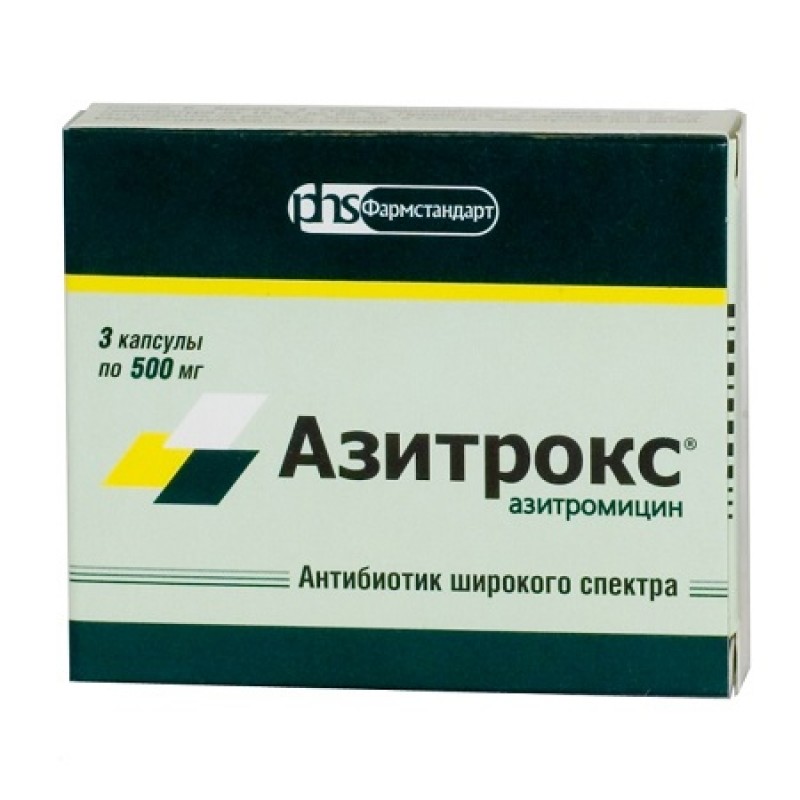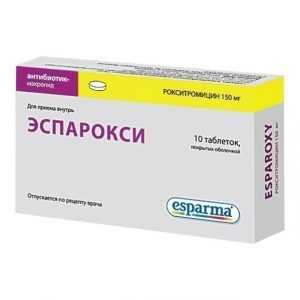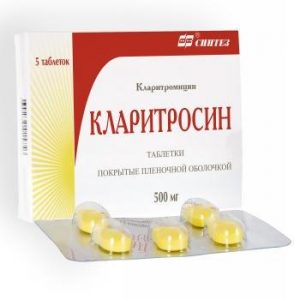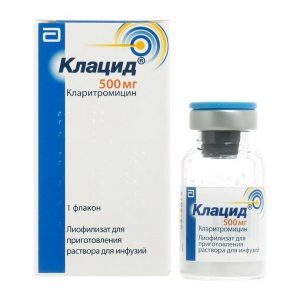Description
Packing
3 pcs
Pharmacological action
Azitrox is a broad-spectrum antibiotic. It is the first representative of a new subgroup of macrolide antibiotics – azalides. When creating high concentrations of inflammation in the focus, it has a bactericidal effect.
Gram-positive cocci are sensitive to azithromycin: Streptococcus pneumoniae, St. pyogenes, St. agalactiae, streptococci of CF and G groups, Staphylococcus aureus, St. Viridans are Gram-negative bacteria: Haemophilus influenzae, Moraxella catarrhalis, Bordetella pertussis, B. parapertussis, Legionella pneumophila, H. ducrei, Campylobacter jejuni, Neisseria gonorrhoeae and Gardnerella microorganisms, microorganisms, microorganisms, microorganisms, pneumoniae, Ureaplasma urealyticum, Treponema pallidum, Borrelia burgdoferi. Azithromycin is inactive against gram-positive bacteria, erythromycin resistant.
Azithromycin persists in bactericidal concentrations in the focus of inflammation for 5-7 days after the last dose, which allowed the development of short (3-day and 5-day) courses of treatment.
Indications
Infectious and inflammatory diseases caused by microorganisms sensitive to the drug: – infections of the upper respiratory tract and ENT organs (tonsillitis, sinusitis, tonsillitis, otitis media)
– scarlet fever
– lower respiratory tract infections (bacterial and SARS, bronchitis)
– infections of the skin and soft tissues (erysipelas, impetigo, secondarily infected dermatoses)
– infections of the urogenital tract (uncomplicated urethritis and / or
– Lyme disease (borreliosis) in the initial stage (erythema migrans)
– diseases of the stomach and duodenum associated with Helicobacter pylori.
Contraindications
severe liver dysfunction
severe renal dysfunction
pregnancy
lactation (breastfeeding)
children under 12 years of age
hypersensitivity to macrolide antibiotics.
Use during pregnancy and lactation
Azitrox is contraindicated in pregnancy.
If you need to use the drug during lactation, you should decide whether to stop breastfeeding.
Composition
1 capsule contains:
Active substances:
azithromycin 500 mg.
Excipients:
anhydrous lactose or mannitol,
corn starch,
magnesium stearate,
sodium lauryl sulfate
Dosage and administration of
Azitrox should be taken 1 hour before a meal or 2 hours after a meal. The drug is taken 1 time / day.
For infections of the upper and lower respiratory tract, infections of the skin and soft tissues, 500 mg / day is prescribed for 3 days (course dose – 1.5 g).
In case of uncomplicated urethritis and / or cerebellum, 1 g is prescribed once (4 capsules, 250 mg each).
In Lyme disease (borreliosis), 1 g (4 caps. 250 mg) is prescribed for the initial stage (erithema migrans) on the 1st day and 500 mg daily from the 2nd to the 5th day (course dose – 3 g).
In diseases of the stomach and duodenum associated with HelicobacterPylori, 1 g (4 capsules of 250 mg) per day is prescribed for 3 days as part of combination therapy.
If you miss one dose of the drug, you should take the missed dose as soon as possible, and the next one with a 24-hour break.
Side effects
From the digestive system: possible nausea, diarrhea, abdominal pain rarely – vomiting, flatulence, transient increase in the activity of liver enzymes.
Dermatological reactions: in some cases, a rash.
Drug Interaction
Long-term vascular spasm was observed when administered with ergotamine. Amigrenin can be prescribed no earlier than 24 hours after taking ergotamine-containing drugs.
Interaction between sumatriptan and MAO inhibitors is possible, their simultaneous use is contraindicated.
There are some reports of development of weakness, coincidentally with the simultaneous administration of clarithromycin and hydroxymethylglutaryl-CoA reductase inhibitors – lovastatin and simvastatin.
There are reports of increased plasma digoxin concentrations in patients receiving both digoxin and clarithromycin tablets. In such patients, serum digoxin content should be constantly monitored to avoid digitalisoxic intoxication.
Clarithromycin may reduce the triazolam clearance and thus increase its pharmacological effects with the development of drowsiness and confusion.
Concurrent use of clarithromycin and ergotamine (ergot derivatives) can lead to acute ergotamine intoxication, manifested by severe peripheral vasospasm and perverted sensitivity. receiving both digoxin and clarithromycin tablets. In such patients, serum digoxin content should be constantly monitored to avoid digitalisoxic intoxication.
Clarithromycin may reduce the triazolam clearance and thus increase its pharmacological effects with the development of drowsiness and confusion.
Concurrent use of clarithromycin and ergotamine (ergot derivatives) can lead to acute ergotomine intoxication, manifested by severe peripheral vasospasm and perverted sensitivity.
Concurrent administration of zidovudine to HIV-infected adults orally and clarithromycin tablets may result in decreased zidovudine concentrations. Given that clarithromycin probably alters the absorption of oral zidovudine administered at the same time,
Co-administration of Azitrox with lincosamides reduces the effectiveness of azithromycin.
When administered concurrently, antacids and ethanol slow and reduce the absorption of azithromycin.
When used together, Azitrox slows excretion, increases serum concentration and increases the toxicity of cycloserine, indirect anticoagulants, methylprednisolone, and felodipine.
Azithromycin, by inhibiting microsomal oxidation in hepatocytes, prolongs T1 / 2, slows excretion, increases the concentration and toxicity of carbamazepine, ergot alkaloids, valproic acid, g
Co-administration of Azitrox with lincosamides reduces the effectiveness of azithromycin.
When administered concurrently, antacids and ethanol slow and reduce the absorption of azithromycin.
When used together, Azitrox slows excretion, increases serum concentration and increases the toxicity of cycloserine, indirect anticoagulants, methylprednisolone, and felodipine.
Azithromycin, by inhibiting microsomal oxidation in hepatocytes, prolongs T1 / 2, slows excretion, increases the concentration and toxicity of carbamazepine, ergot alkaloids, valproic acid, gxobarbital, phenytoin, disopyramide, bromocriptine, theophylline (and other xanthine derivatives), oral hypoglycemic agents.
Pharmaceutical Interaction
Pharmaceutically incompatible with heparin.
Overdose
When taking high doses of the drug, there may be an increase in side effects: temporary hearing loss, severe nausea, vomiting, diarrhea.
In this case, gastric lavage, activated charcoal administration, symptomatic therapy are shown.
Storage conditions
The drug should be stored in a dry, dark place, out of the reach of children, at a temperature of 15 ° to 25 ° C.
Expiration
2 years.
Active ingredient
Azithromycin
pharmacy
pharmacy prescription
dosage form
dosage form
capsules
Pharmstandard-Leksredstva, Russia




